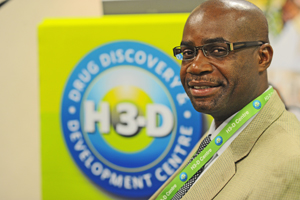Drug discovery centre prepares new generation of scientists for continent
03 June 2011 Value chain: Prof Kelly Chibale heads up the H3-D Drug Discovery and Development Centre, the first drug development centre of its kind in Africa.
Value chain: Prof Kelly Chibale heads up the H3-D Drug Discovery and Development Centre, the first drug development centre of its kind in Africa.
UCT recently celebrated the official launch of the H3-D Drug Discovery and Development Centre - the first drug development centre of its kind in Africa.
The Centre is poised to dramatically enhance capabilities in the early stages of the drug discovery innovation chain and will focus on finding drugs that combat life-threatening diseases, many of which are prevalent on the continent.
H3-D Director Professor Kelly Chibale says South Africa had previously been working from the polar ends of the value chain of drug discovery and development. "The country is really good at the basic science on one end, and conducting the clinical research at the other. However, it has not been adding value in the areas in between, where the real opportunities exist," he argues.
Chibale, who also holds the chair in drug discovery in the South African Research Chairs Initiative, says H-3D aims to bridge the gap between the basic and clinical sciences and to build the necessary skills and experience in drug development that have been lacking on the continent. An attendant vision is to deliver clinical candidates ready for testing in humans, which in turn will complement and strengthen the Institute of Infectious Disease and Molecular Medicine's activities, bridging the current gap that exists between basic science and the clinical studies of various diseases at UCT.
He is passionate about developing future generations of world-class scientists and creating an infrastructure and environment that will spur on drug discovery and related industries. In turn, it is his hope is that many more solutions will be found to counter some of the world's most devastating diseases, which make their presence felt so overwhelmingly and painfully on the African continent.
While these issues are close to Chibale's heart, they also lie at the core of UCT's Drug Discovery Signature Theme - one of several research themes the University is committed to nurturing and supporting in the foreseeable future.
Chibale believes the Centre will add substantial value to projects because potential gaps and weaknesses have already been identified. "We have put in place the necessary platforms and will be looking to bring in relevant pharmaceutical industry expertise, as well as partnerships with pharmaceutical companies and 'virtual' drug research and development organisations, such as the Medicines for Malaria Venture and the Global Alliance for Tuberculosis Drug Development."
"H3-D will create an appropriate infrastructure for collaborative drug discovery and development, and sow the seeds for a viable pharmaceutical industry in South Africa. Its links with a strong global scientific network will also ensure that projects meet internationally recognised standards."
Chibale believes it is this combination of factors that will produce a critical mass of new scientists who will develop drugs to fight infectious and other diseases, and who will have a greater understanding of the health issues facing sub-Saharan Africa.
 This work is licensed under a Creative Commons Attribution-NoDerivatives 4.0 International License.
This work is licensed under a Creative Commons Attribution-NoDerivatives 4.0 International License.
Please view the republishing articles page for more information.







